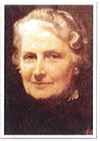Education Philosophy
 As an educator, you are asked time, and time again: “What is your philosophy on education?” Answering this question takes considerable thought because knowledge can be approached at many levels: education the whole child, molding learning styles to the individual, assessing methods, and retaining knowledge.
As an educator, you are asked time, and time again: “What is your philosophy on education?” Answering this question takes considerable thought because knowledge can be approached at many levels: education the whole child, molding learning styles to the individual, assessing methods, and retaining knowledge.
When learning takes place, it should be – if nothing else – meaningful. Dr. Maria Montessori realized this over one hundred years ago. She discovered that unless there was a child-driven reason to learn a skill, it would be useless to that individual.
When placed in an environment that is rich in different hands-on materials demonstrating a connection to learning the content areas of penmanship, math, history, English, foreign languages, and government; the child learns and retains that knowledge. Research has shown that the learning takes place quicker and is retained longer than traditional methods of note-taking and rote memorization purely based on auditory and visual learning (Bruner, Jerome. “The Mid of a Mnemonist.” Harvard Publishing Press, 1987).
It is fascinating to read about the works of Dr. Maria Montessori. She understood that there is so much potential to every child regardless of intellectual ability. Furthermore, she knew the importance that each child will learn at his or her own pace, and should never be forced by a teacher to master a skill before the proper time. Failure, as often experienced in mon-Montessori schools, is replaced with continued practiced and re-direction so success and self-satisfaction is the end result.
Traditional methods tend to block out the avenue of learning that utilizes how the human body works: feeling, seeing, and self-discovery. In the Montessori method, students are invited, not demanded, to explore a new skill in a totally non-intimidating manner. At the same time, a teacher (better known in Montessori as a facilitator) monitors the learning to ensure that the child stays motivated and on-task.
On a personal level, being trained as a traditional teacher who relied on a district-set curriculum and textbooks to meet my educational goals and objectives in the classroom, Dr. Maria Montessori’s method has totally changed how I encompass my philosophy on education:
Education should be centered on the whole child, in a setting that is self-paced, yet encouraged and guided by a trained facilitator who makes learning meaningful and enriching at all levels.
It is my wish that every child experience such a revelation.
![]()
Cynthia Poole, M.Ed.
Administrator

